Southern Regional Station, Bengaluru
Southern Regional Station of National Dairy Research Institute is the pioneering institution in Dairying and has undergone a series of changes during its history of more than eighty seven years. It had its origin on 16th July 1923 as Imperial Institute of Animal Husbandry and Dairying, established as a centre for training and research in dairying in the country. This centre was the first to initiate training in artificial insemination in cattle in the country and also research in different fields of dairy production and processing in India. A two year course leading to Indian Dairy Diploma (IDD) was started as back as in 1923 and it is a matter of pride that the Alumni of the Institute served at various capacities for the development of dairy sector in the country. One of the memorable events of the Imperial Institute was the visit of Mahatma Gandhi in 1927 who got acquainted with scientific dairy farming. After independence, Imperial Dairy Research Institute was renamed as Indian Dairy Research Institute. The activities of the institute were further strengthened during 1952-54 by locating a Central Artificial Insemination Centre, Key Village Scheme and Southern Regional Animal Nutritional Research Centre at Bangalore. Indian Dairy Research Institute was reorganized in 1955 and renamed as National Dairy Research Institute with headquarters at Karnal. The establishment at Bangalore was redesignated as Southern Regional Station of NDRI. The Campus is endowed with necessary infrastructure in terms of qualified staff, having 160 employees, including about 21 Scientists, farmland of about 21 ha, dairy herd of about 250 animals comprising Deoni, Malnad Gidda cattle & HF Crossbred cattle, laboratories, experimental dairy plant, library, staff dispensary, and students hostel & guest house facilities. The Station functions with following Mandates & Objectives focused on the region issues.
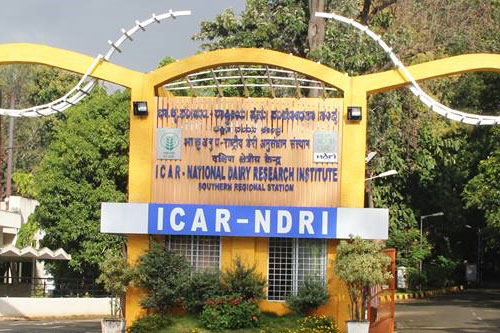
Mandate
- Identify the region specific problems of dairy production, processing and management on continuing basis and evolve suitable solutions.
- Establish centers for technology development, assessment and dissemination.
- Establish centers of advanced studies for R & D and HRD with the Station as the Southern Campus of NDRI Deemed University.
Objectives
- Faster multiplication of superior germplasm of region specific breeds of cattle and buffaloes through interventions.
- Process upgradation for the industrial production / packaging of region specific dairy products.
- Establishment of the regional referral centre for quality assurance of dairy products.
- Economic analysis of various aspects of dairying and establishment of data bank for strategic development of dairying in the region.
- Establishment of model villages with integrated development focused on dairying.
- Transfer of technologies suitable for the crop-livestock production systems prevalent in agro-climatic conditions of the region.
- Training of farmers and industrial entrepreneurs at technology development centers.
- Undertake advanced HRD programmes to meet the needs of the industry.
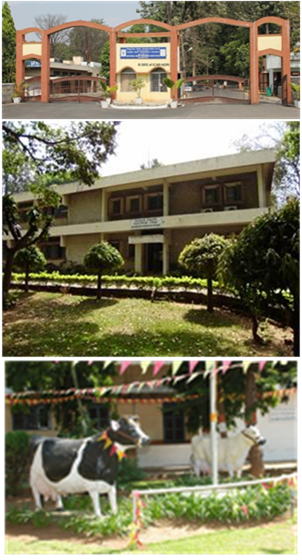
The station pioneered the activities in respect of artificial insemination in the country. Simple and reliable test (Motility Index) for evaluating semen was developed. Introduction of 10-ml. taurine buffers in the genital tract immediately before AI, found to improve conception in cattle. The Nutritional survey of dairy cattle carried out by the station in Southern India was perhaps one of the earliest works in animal nutrition and the study brought out the feeding practices and deficiency of minerals in cattle ration. The research finding of feeding of urea ammoniated paddy straw to milch animals resulted in significant (20%) increase in milk yield and 20% reduction in cost of milk production by way of reduction of concentrate requirement. Under the Key Village Scheme, Key Farm Centres were established for facilitating primary activities and providing veterinary health care. Calibration of lactometer lead to a great help to dairy industry. Simple and rapid electrometric method for estimation of SNF was developed. Methods were developed to detect adulteration of ghee with Vanaspathi and Vegetable Oil. Bacteriological standards were suggested for grading of milk and quality evaluation of pasteurized milk. A sediment chart was developed to assess the dirt content in milk. Successfully developed and modified the methodologies for manufacture of dairy products viz., fruit flavored high fat yoghurt, low cost cream spread, kadhi power, cholesterol free mozzarella cheese and basundi. An easy to constitute dry mix was developed for 'Palada Payasam'. Extensive studies on cost of milk production and constraint analysis of dairy farming were carried out.
- The Malnad Gidda is unique dwarf cattle which mostly thrive on grazing and play a unique role in the farming systems of the heavy rain fall Malnad and coastal regions of Karnataka. Good number of cows calved more than 15 calves in their life time. The lactoferrin content in Malnad Gidda cattle milk was found to be higher (range 48.98 to 157.10µg/ml). The breed was got registered as a distinct indigenous breed of Karnataka.
- The studies on the frequency of A1 and A2 casein allele in Malnad Gidda, Deoni, HF cattle and HF graded cattle indicated that A2 allele is fixed in Deoni cattle while the frequency of A1 allele among graded HF cattle was 0.3. Among Malnad Gidda cattle except 3 cows from one herd all the 154 cows screened were of A2A2 type.
- Efforts were made for the on the spot diagnosis and control mastitis especially subclinical mastitis through testing of milk by electrical conductivity meter, assessing somatic cell counts by California Mastitis Test (CMT) and automated digital reader.
- Demonstration cum training programmes relating to sub-clinical mastitis were arranged for around 1000 farmers of Bangalore and Kolar districts and the programme made tremendous impact on dairy farmers and dairy co-operative societies.
- A total of fifteen commercial dairy farms maintaining graded Holstein Friesians located around Ludhiana, Moga, Mohali and Chandigarh were visited and personal interviews with the farmers were conducted. The intensive management inputs coupled with expert advice are resulting in good conception rate, regular calving, and healthy growth of young stock and higher yields.
- It is suggested to establish feed mixing units in border districts of Tamil Nadu/ Karnataka and import ready mix feed. All water logging lands in Kerala can be converted into ‘Para Grass fields’ thus improving fodder availability. Further, there is strong reason to promote dairy farming in high altitude regions like, Palakkad, Wyanad & Idukki.
- Using homogenous fermentation kinetics of heterogenous feedstuffs, concentrate supplements were formulated to cater the intensity of fermentation to support different levels of milk production.
- An attempt was made to develop a dry mix using popped ragi and milk solids. Channa Jhilli prepared according to the standardized procedure was evaluated for its shelf life.
- Technology for preservation of Kunda and Chhana Podo by EVOH & PET multiplayer high barrier packaging material coupled with oxygen scavenger was developed. The product thus packed can be kept well without spoilage over 45 days in case of Chhana Podo & more than 180 days in case of Kunda.
- A method for the preparation of ready to reconstitute payasam dry mix incorporating ground green gram dhal and poppy seeds and skim milk powder was standardized.
- Whey drink was prepared from both protein and lactose hydrolyzed whey with 8% sugar, 1% starch and 4% mango pulp which was acceptable for the consumers. Thermization of whey drinks at 650C for 10 min has shown an increased shelf life of the product.
- For the preparation of sugarless khoa jalebi, non-conventional sweeteners and bulk sweeteners were tried in place of sucrose. Using combination of these sweeteners, a sweetened syrup has been formulated for the preparation of sugarless khoa jalebi.
- Extracts of some of the vegetables and fruits were used in the preparation of buttermilk drinks for enhanced health benefits. An attempt was made to improve the textural stability of buttermilk drinks through homogenization of the milk used and addition of stabilizers. Thermization and carbonation of buttermilk drinks helped to extend the shelf-life of the buttermilk drinks.
- Paneer was coated with casein, whey protein concentrate and tapioca starch coatings and dried. Paneer coated with starch and casein stored well and was of similar quality. Therefore, edible coatings can be recommended for paneer for extension of its shelf life.
- Orange peel having antioxidants activities could be used as a cheap natural source of natural antioxidants which can be used in fat rich dairy products like ghee for retarding oxidative deterioration
- The Techno-economic study conducted indicated that the two technologies transferred namely, gulam jamoon mix & palada payasam mix are doing well at KMF and MILMA respectively and enabled the Federations to add new product to their product mix, besides realizing higher revenue
- Economic analysis of manufacture of selected dairy products in the organized dairies from Southern states indicated that cost of production of dairy products varied across the dairies. It was also found that the dairies had created good infrastructure and provided services for the development of the dairy farmers.
- The role of government organizations is analyzed in terms of functions, financial support, programme organized and capacity building activities for entrepreneurial development of rural women and in terms of entrepreneurial initiatives, facilitation, support and sustenance
- The milk products used in the traditional systems, Ayurveda, Unani, Siddha and homeopathy include curd, buttermilk, butter, ghee, cream, whey and paneer. Milk and milk products play an important and inevitable role in all the three traditional medicinal systems.
- The profile study on small holder dairy production systems in the southern region indicated that majority of the respondents possessed 2-5 dairy animals (64-76%). The cost of milk production in the region ranged from Rs.17-23/litre. It was revealing that dairy farmers are facing umpteen constraints that arrest dairy development and need to be redressed on priority.
- The dairy entrepreneurship development of two Self Help Group members involved in dairy farming were studied and entrepreneurship trainings were imparted to study the impact on their livelihood.
- On-farm and off-farm Training programmes were arranged for dairy entrepreneurs/dairy farmers for hand on training programme for its future application towards control of subclinical and clinical mastitis
- The extension section was involved in conducting visitors to the institutes, providing advisory services, conducting orientation and training programmes and distribution of extension literature prepared in local languages for the benefit of farmers.
- Extension section is also involved in conducting various training programmes & participation in different Exhibition.
- Evaluation of single nucleotide polymorphism in candidate genes associated with semen quality in murrah buffaloes and khillar cattle
- Investigation on QTL and non genetic factors regulating postpartum productive and reproductive performances in Deoni cattle
- Studies on reproductive performance and fertility augmentation in Deoni cattle
- Investigation on factors affecting semen quality and freezability in Deoni and Malnad Gidda cattle
- Incorporation of inulin and resistant starch in cheddar cheese to enhance functional attributes
- Utilisation of lactose hydrolysed whey in the preparation of probiotic fermented beverages
- Post processing interventions to improve quality and shelf-life of curd rice
- Design and development of microprocessor based automated instrumentation system for pneumatic paneer hoop cum-press unit.
- Analysis of energy and exergetic performance of spray drying system for milk-malted millet food.
- Development of khoa jalebi using non-conventional sweetners
- Extension of shelf-life of ghee using extracts of fruits and vegetable by products
- Isolation and identification of bacteriophages from dairy products and environment and evaluation of starter culture for the phage resistance
- Dairy entrepreneurship development of rural women: An action research
- Geospatial databank and data mining for strategic planning and development of dairying in Karnataka state
- Evaluation and Improvement of indigenous cattle of Malnad Region of Karnataka
- As a new initiative at SRS, the ‘Dairy Education at Farmer’s Door’, was organized and visits were made by the multidisciplinary team on second Saturdays to villages in and around Bangalore districts. Necessary technical advice was rendered by the multidisciplinary team on various aspects of scientific dairy farming, green fodder production, clean milk production and dairy animal management aspects to the needy clientele group at their doorsteps.
- A new cluster of villages has been identified to implement Rural Extension Programme.
SRS of NDRI has been the pioneering institution in dairy education in the country. The Indian Dairy Diploma and subsequent educational and capacity building programmes greatly enabled the dairy industry in providing the right man power to meet the requirements of the industry. The educational activities of the station are being expanded to accommodate more students in future. A Post Graduate Programme in Food Quality and Safety Assurance was started in 2014 to meet the requirement of dairy industry. Course work for Diploma in Dairy Technology, M.Tech in Dairy Technology, Dairy Enginnering & Food Quality and Safety Assurance and Ph.D in Dairy Engineering are being offered at SRS, while students after completing the course work from NDRI Karnal report at SRS for pursuing their dissertation work in the disciplines of AGB,LPM, AN, DC & DB, D.Econ & D.Extn. The station has more than 100 students undergoing Diploma in Dairy Technology, Post Graduate & Doctoral Programmes in various disciplines of Dairy Science. The students are also enabled for placement for their potential employment through placement cell. Besides, the Station also runs a variety of tailor made training programmes of varying duration for the benefit of farmers and entrepreneurs. SRS organizes Model Training Course, ICAR Summer / Winter Schools and sponsored Training Programmes as part of capacity building endeavor.
- Hamster egg penetration bioassay for fertility assessment of bulls.
- Enhancement of buffalo sperm motility and fermentation of invitro natured oocytes by pentoxyfilline and heparine treatment.
- Calibration of lactometer
- Palada Payasam Mix, Gasa Gase payasam mix & Avalakki Payasam technologies
- Process manufacture of Kalan with extended shelf life Standardized
- Gulab Jamoon Mix technology
- Cheese Puri Mix technology
- Curd Rice technology
- Kunda Process manufacture standardized
- Khadi Powder technology
- Channa Podo technology
- Instant Palada Payasam Mix
- Basundi Process manufacture standardized
- Palada Payasam Mix technology transferred to MILMA, Kerala for commercial production.
- Gulab Jamoon Mix technology transferred to KMF, Bangalore for commercial production.
- Development of buttermilk with added health benefits and extended shelf-life.
- Productivity enhancement and quality milk production from Indigenous cattle, buffaloes and crossbred cattle in the region through genetic, biotechnological, nutritional and managemental interventions
- Development of dairy foods with synbiotics, micronutrients & bioactive compounds.
- Adoption of emerging technologies, modeling & innovative packaging.
- Modernization of dairy education & capacity building
- Analysis of milk production systems, value chains, constraint analysis and Geo-Spatial data base on dairying.
- Development of model village for technology transfer activities and utilization of ICT.

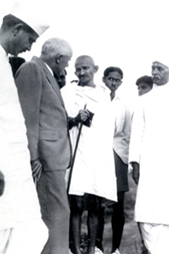
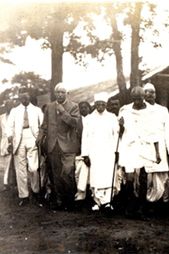
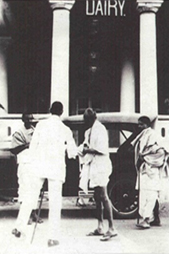
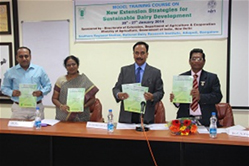
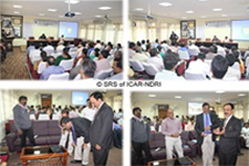
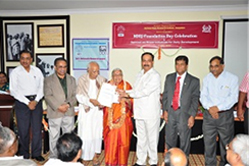
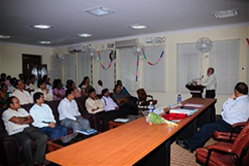
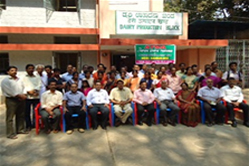


| Sr. No. | Name of the Faculty | Designation |
|---|---|---|
| 1 | Dr. K. P. Ramesha | Principal Scientist & Head |
| 2 | Dr. B. Surendranath | Principal Scientist |
| 3 | Dr. Satish Kulkarni | Principal Scientist |
| 4 | Dr. B.C. Ghosh | Principal Scientist |
| 5 | Dr. P.K. Dixit | Principal Scientist |
| 6 | Dr. B. Srinivas | Principal Scientist |
| 7 | Dr. K. Jayaraj Rao | Principal Scientist |
| 8 | Dr. D.N. Das | Principal Scientist |
| 9 | Dr. P. Heartwin Amaladhas | Principal Scientist |
| 10 | Dr. M. Sivaram | Principal Scientist |
| 11 | Dr. Menon Rekha Ravindra | Principal Scientist |
| 12 | Dr. M.C. Arunmozhi Devi | Senior Scientist |
| 13 | Dr. S. Jeyakumar | Senior Scientist |
| 13 | Er. F.Magdaline Emerald Eljeeva | Senior Scientist |
| 14 | Dr. Mukund A. Katakalware | Senior Scientist |
| 15 | Dr. A. Kumaresan | Senior Scientist |
| 16 | Dr. Manjunatha M | Scientist |
| 17 | Dr. S. Varalakshmi | Scientist |
| 18 | Dr. S. Subash | Scientist |
| 19 | Dr. A. Manimaran | Scientist |
| 20 | Dr. Laxmana Naik N | Scientist |
- Back to previous page
- |
-
Page last updated date:24-03-2025 04:07 PM












